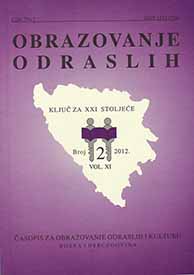Obrazovanje odraslih kao faktor ostvarivanja koncepta fleksigurnosti
Adult education as an factor for the realisation of the flexicurity concept
Author(s): Aleksandra Pejatović, Tamara KunićSubject(s): Education, Adult Education
Published by: JU ‘’Bosanski kulturni centar Kantona Sarajevo’’
Keywords: adult education; flexicurity concept; lifelong learning concept;
Summary/Abstract: The term, more frequently occurring in the last few years in the European documents dealing with different aspects and possible development trends of employment policy primarly aimed at reducing the growing unemployment rate, is ''flexicurity''. The essence of this concept, which is becoming more and more current with the world economic crisis, is the employees, in order to maintain this status, have to express, meaning that they have to be trained for flexibility reflected in readiness for, and thus largely for the possibility for frequent job changes and changes of institutions and organisations in which they work, as well as for continuous knowledge acqusition and development of skills and competences. In addition, the flexicurity concept also emphasises the necessity of providing security, through the role of the state in the form of providing sufficient job position, enabling the emloyment of a larger number of people under good conditions and providing strong support in case of unployment. The subject of this paper is studying the role of adult education in implementing the flexicurity concept. As a manifestation of lifelong learning, adult education has a key role in acquiring knowledge, skills and competences, which is why it has long become a strong factor of economic development, increase of competitiveness, employability and employment. In line with the aforementioned subject, the aim of this paper is to, by analysis of the relevant literature and European documents devoted in different ways and in varying degrees to the flexicurity concept, explore the role of adult education in implementing this concept.
Journal: "Obrazovanje odraslih" - Časopis za obrazovanje odraslih i kulturu
- Issue Year: XII/2012
- Issue No: 2
- Page Range: 9-26
- Page Count: 18
- Language: Serbian

